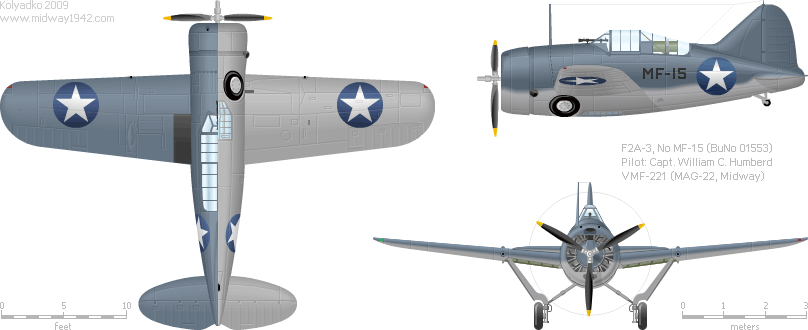
| Brewster F2A Buffalo | CARRIER FIGHTER | |

| . | . | Model F2A-3 | . | ||||||||||
| Length: | 26 ft 4 in | 8.0 m | Power Plant: | Wright R-1820-40 Cyclone 9 | Fuel Capacity: | 160 gal | 605 L | ||||||
|---|---|---|---|---|---|---|---|---|---|---|---|---|---|
| Height: | 12 ft | 3.65 m | Military Power: | 1200 hp | 895 kW | Combat Range: | 840 nm | 1550 km | |||||
| Wingspan: | 35 ft | 10.6 m | Power/Weight: | 0.19 hp/lg | 0.42 hp/kg | Service Ceiling: | 33,200 ft | 10 120 m | |||||
| Wingarea: | 209 sq ft | 19.4 m² | Speed, SL: | 252 kts | 467 km/h | Nose Guns: | 2 × .50 (12.7 mm), 750 rds * | ||||||
| Empty Weight: | 4,732 lb | 2146 kg | Max Speed: | 278 kts | 515 km/h | Wing Guns: | 2 × .50 (12.7 mm), 450 rds | ||||||
| Gross Weight: | 6,321 lb | 2867 kg | Cruise Speed: | 140 kts | 259 km/h | Salvo Weight: | 3.66 lb/sec | 1.66 kg/sec | |||||
| Wing Loading: | 30 lb/ft² | 147.8 kg/m² | Rate of Climb: | 2,290 ft/min | 698 m/min | Bomb Load: | 2×100 lb (45.4 kg) | ||||||
| . | * Allowance of ammunition, rounds per gun. | ||||||||||||
In 1935, the U.S. Navy issued a requirement for a carrier-based fighter intended to replace the Grumman F3F biplane. The Brewster XF2A-1 all-metal monoplane, designed by a team led by Dayton T. Brown, was one of two aircraft designs that were initially considered, the second competitor, Grumman XF4F-1 with a double-row radial engine, was a "classic" biplane. The XF2A-1 first flew on 2 December 1937 and early test results showed it was far in advance of the Grumman biplane entry.